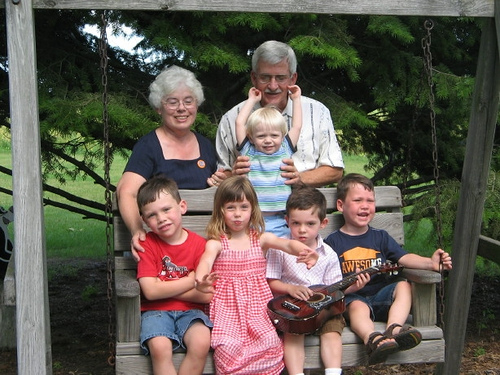Tips for the Transition to Step-Grandparent

According to statistics, 33% of people 65 and older are step-grandparents, and the number is increasing. Some become step-grandparents when they marry a divorcee with grandchildren. Others have a son or daughter who marries into a stepfamily.
Whatever your situation, the role of step-grandparent can be tricky, You want to be involved with your step-grandkids while being sensitive to the nature of the relationship. Though every situation is unique, here are some tips every step-grandparent can use to make the transition easier for everyone.
Affection
You may naturally want to shower your step-grandchildren with affection, but be aware you may be ready for this before they are. Your step-grands may feel you are intruding on their family dynamic, and accepting your role may take some time.
They likely have biological grandparents in their lives. They might feel reluctant to add another grandparent to the mix. Older children are especially likely to keep their distance.
Don’t blame yourself if you and your step-grandkids don’t become close right away – or ever. Developing a strong relationship takes time; allow your relationship with your step-grandkids to develop naturally.
It’s best to show verbal affection before displaying physical affection.
Praise them and tell them you are proud of them. As you become closer, offer to give them hugs. Don’t be offended if they refuse.
Let the children show you how much affection they are comfortable with.
Never try to buy your step-grandkids’ love. Do give them gifts on gift-giving occasions, but if you have a gift in hand every time you see them, you’ll interfere your relationship from developing naturally. Just be sincere and warm. Don’t be worried if things seem to take a long time.
Involvement
To foster a close relationship with your step-grandchildren, get involved in their lives to a level comfortable for all parties. Attend some of their recitals, games, etc. Showing your support for them will go a long way to building trust and developing strong ties.
Teaching step-grandkids a game or skill will also help form a bond. Be observant about what their interests are and offer to teach them something they might enjoy.
As you get involved with your step-grandkids, be careful not to be overly involved.
Don’t try to replace biological grandparents and never criticize them or other adults in the family.
This will lead to resentment from both grandparents and grandchildren.
If you have biological grandchildren of your own, make sure you are treating all grandchildren the same. Children should feel like they are loved equally by all the adults in the family.
Time
As you get more involved in your step-grandkids’ lives, be wary of scheduling all of your time together. Have some down time when no particular activity is scheduled. Sometimes the strongest bonds are formed spontaneously.
One step-grandfather recalls the time his step-granddaughter saw him chewing cinnamon gum and asked for some. He told her she wouldn’t like it because it was spicy, but she insisted. She loved the “hot gum,” and now every time she sees him she asks for a piece.
Step-Grandparent Names
Don’t force step-grandchildren to call you “Grandma” or “Grandpa.” They may feel uncomfortable doing so or may feel like they are betraying their biological grandparents.
A common way to solve the name issue is to add the title “Grandpa” or “Grandma” to your first name (i.e. Grandma Jane or Grandpa Joe).
This gives you grandparent status while distinguishing you from biological grandparents. Another option is to create a unique affectionate name (like Gammy or Yaya).
Open Communication
One of the most important things to remember is to have open, honest communication with everyone involved. Talk to step-grandchildren about how they are feeling; talk with your spouse and if necessary talk to biological grandparents to make sure everyone is comfortable with your level of involvement in the family.
Remember your relationship with your step-grandchildren will continue to change as they get older. Keep the lines of communication open.
You may find you form such a strong relationship with step-grandchildren, they see you as part of the family and rely on you even after biological grandparents are no longer around.
Families from all around report finding great strength in their relationship with a step-grandparent after their biological grandparent was confined to a Los Angeles nursing home or had to receive home care in Toronto.
Above all, be sensitive to the complexities of becoming a step-grandparent and take things slow. Strong relationships develop over time. You may never be exactly like a biological grandparent to your step-grandchildren, but you can still be a very important person in their lives.
Edson Senna is a freelance writer who specializes in family matters and finance. He gets many of his writing ideas from companies like Care 2000 Health Services. Edson enjoys spending time with his family and friends in his spare time.
Do you have suggestions for other tips? Please leave them in the Comments. Thank you.







